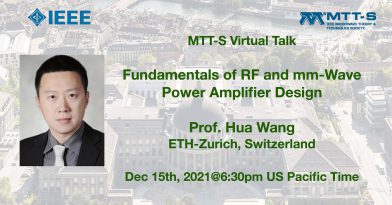
-
Wednesday, December 15, 2021 6:30 pm - 8:00 pm(Los Angeles Time) Add to my calendar
Fundamentals of RF and mm-Wave Power Amplifier Design
Prof. Hua Wang
ETH-Zurich, Switzerland
Abstract: This talk presents a focused overview of mm-wave power-amplifier (PA) designs in silicon, including design fundamentals, advanced PA architectures, and state-of-the-art design examples. The talk will start with an introduction of PA performance metrics and their impacts on wireless systems. Next, it presents the design fundamentals of PA active devices and passive networks as well as power combining strategies. The tutorial discusses advanced PA architectures, including Doherty, Outphasing, and Hybrid PAs, for high efficiency, linearity, and bandwidth. Antenna-PA co-designs are covered as well to achieve on-antenna power combining, active load modulation, and reconfiguration. Further, advance and challenges of high mm-Wave PAs will be covered to address the emerging beyond-5G/6G applications. Finally, the talk will conclude with several state-of-the-art mm-wave PA design examples.
Speaker’s Bio: Hua Wang is a full professor and chair of electronics at Department of Information Technology and Electrical Engineering (D-ITET) of Swiss Federal Institute of Technology Zürich (ETH Zürich). He is the director of the ETH Integrated Devices, Electronics, And Systems (IDEAS) Group. Prior to that, he was an associate professor with tenure at the School of Electrical and Computer Engineering (ECE) at Georgia Institute of Technology, USA. He held the Demetrius T. Paris professorship at School of ECE at Georgia Tech. He was the founding director of Georgia Tech Center of Circuits and Systems (CCS) and the director of the Georgia Tech Electronics and Micro-System (GEMS) lab. He worked at Intel Corporation and Skyworks Solutions from 2010 to 2011. He received his M.S. and Ph.D. degrees in electrical engineering from the California Institute of Technology, Pasadena, in 2007 and 2009, respectively.
Dr. Wang is interested in innovating analog, mixed-signal, RF, and mm-Wave integrated circuits and hybrid systems for wireless communication, sensing, and bioelectronics applications. He has authored or co-authored over 200 peer-reviewed journal and conference papers.
Dr. Wang received the DARPA Director’s Fellowship Award in 2020 (the first awardee in Georgia Tech’s history), the DARPA Young Faculty Award in 2018, the National Science Foundation CAREER Award in 2015, the Qualcomm Faculty Award in 2020 and 2021, the IEEE MTT-S Outstanding Young Engineer Award in 2017, the Georgia Tech Sigma Xi Young Faculty Award in 2016, the Georgia Tech ECE Outstanding Junior Faculty Member Award in 2015, and the Lockheed Dean’s Excellence in Teaching Award in 2015.
His research group has won multiple academic awards and best paper awards, including the 2019 Marconi Society Paul Baran Young Scholar, the IEEE RFIC Best Student Paper Awards (2014, 2016, 2018, and 2021), the IEEE International Microwave Symposium (IMS) Best Student Paper Award 2021, the IEEE CICC Outstanding Student Paper Awards (2015, 2018, and 2019), the IEEE CICC Best Conference Paper Award (2017), the 2016 IEEE Microwave Magazine Best Paper Award, and the IEEE SENSORS Best Live Demo Award (2nd Place in 2016).
Dr. Wang is a Technical Program Committee (TPC) Member for IEEE ISSCC, RFIC, CICC, and BCICTS conferences. He is a Steering Committee Member for IEEE RFIC and CICC. He is the Conference Chair for CICC 2019 and Conference General Chair for CICC 2020. He is a Distinguished Microwave Lecturer (DML) for the IEEE Microwave Theory and Techniques Society (MTT-S) for the term of 2022-2024. He is a Distinguished Lecturer (DL) for the IEEE Solid-State Circuits Society (SSCS) for the term of 2018-2019. He serves as the Chair of the Atlanta’s IEEE CAS/SSCS joint chapter that won the IEEE SSCS Outstanding Chapter Award in 2014.
This event is organized by IEEE Santa Clara – San Francisco Microwave Theory and Techniques Chapter.